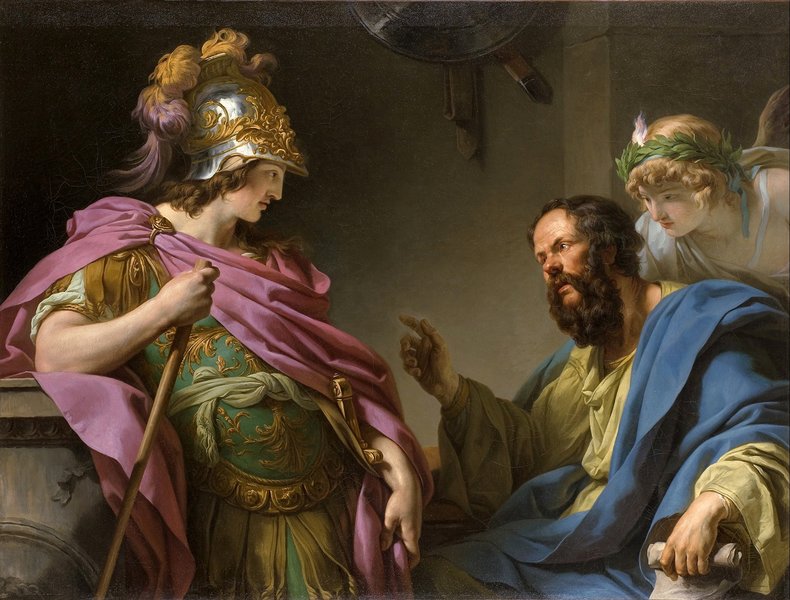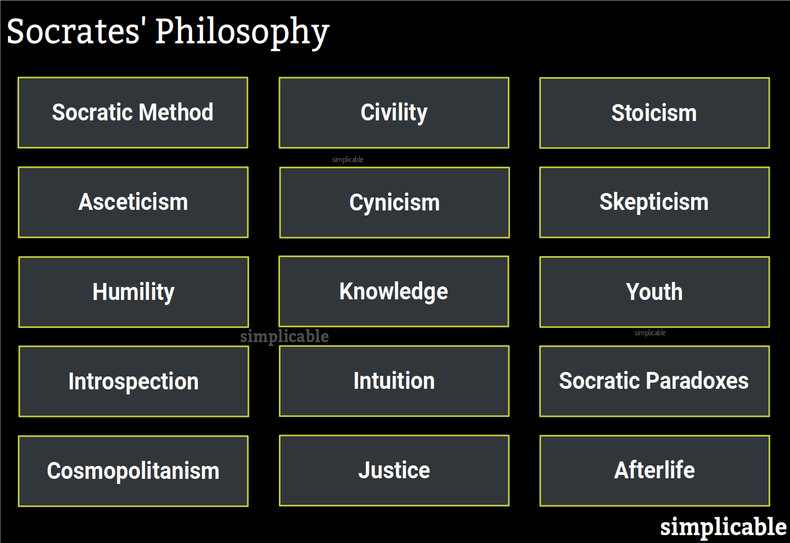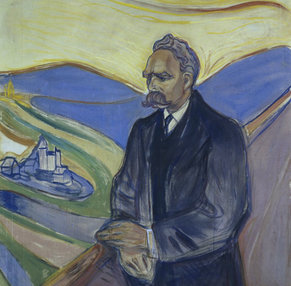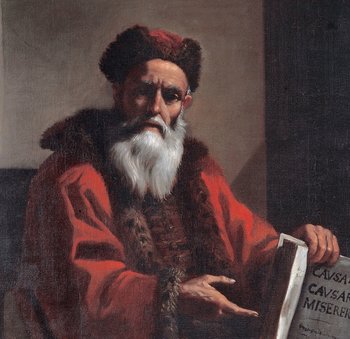
This man here is so bizarre, his ways so unusual, that, search as you might, you'll never find anyone else, alive or dead, who's even remotely like him. The best you do is not to compare him to anything human, but liken him, as I do, to Silenus and the satyrs, and the same goes for his ideas and arguments.Socrates was a Greek philosopher from Athens who is considered a founder of Western philosophy. He lived in the 5th century BC and didn't write anything directly such that most of what we know about him comes from the accounts of his students such as Plato and Xenophon. The following are considered important elements of Socrates' philosophy.
~ Alcibiades [on Socrates] from Plato's Symposium

Socratic Method
Socrates was a totally new kind of Greek philosopher. He denied that he had discovered some new wisdom, indeed that he possessed any wisdom at all, and he refused to hand anything down to anyone as his personal ‘truth’, his claim to fame. All that he knew, humbly, was how to reason and reflect ....The Socratic method is the process of determining knowledge by identifying a hypothesis and examining it critically in an attempt to disprove it. This typically involves breaking a problem into a series of questions and developing multiple hypothesizes for each question with intent to disprove them. The Socratic method influenced everything from law to science and can be viewed as a basis for rational thought. This challenged the prevailing method of inquiry at the time known as rhetoric whereby persuasive arguments were made to support a theory.
~ John M. Cooper, Introduction to Plato's Complete Works, 1996
Civility
There is no greater evil one can suffer than to hate reasonable discourse.Socrates demonstrated and advocated for civility, civil duty and community involvement throughout his life. For example, Socrates served in the military as a soldier in the Peloponnesian War where he was recognized for his valor. As a philosopher he was willing to communicate brave and unpopular ideas such as praising Sparta, the enemy of Athens in his time. When he was put on trial for challenging the ideology of the state, Socrates participated in his trial and presented a vigorous defense. Ultimately, Socrates accepted the outcome of this trial -- a death sentence when he could have easily survived simply by leaving Athens.
~ Socrates from Plato's account of Socrates' death
Stoicism
I wish to deal with human beings, to associate with man in general; hence my choice of wife. I know full well, if I can tolerate her spirit, I can with ease attach myself to every human being else.Socrates proposed that "ethical virtue is the only thing that matters." This can be viewed as a founding principle of stoicism, the philosophy that circumstances such as luck and misfortune don't matter because it is only your virtuous response to each situation that matters. Stoicism was founded by Zeno of Citium who was greatly influenced by Socrates. The life of Socrates, his acceptance of his death sentence in particular, are often cited as an example of stoicism.
~ Socrates as quoted by Xenophon
Asceticism
Bad men live that they may eat and drink, whereas good men eat and drink that they may live.Asceticism is the avoidance of self-indulgence and pursuit of self-discipline. Socrates is viewed as an ascetic as he advocated for the pursuit of virtue over wealth or power. He appeared to demonstrate this ideal with his life. For example, he didn't pursue wealth or a life in politics despite being a well known figure in his day. He also, by all accounts, lived humbly with few possessions and maintained a generally messy appearance.
~ Socrates as quoted by Plutarch
Cynicism
Socrates … is the first philosopher of life … thinking serves life, while among all previous philosophers life had served thought and knowledge. … Thus Socratic philosophy is absolutely practical: it is hostile to all knowledge unconnected to ethical implications.Cynicism, as a philosophy, is the pursuit of virtue that calls for complete asceticism and rejection of elements of life that are "unnecessary" to virtue. A philosopher known as Diogenes is credited with founding cynicism. He was certainly influenced by Socrates. For example, Diogenes was a critic of Plato and his interpretations of Socrates after his death. The philosophy of Socrates is somewhat supportive of cynicism. However, as compared to Diogenes, Socrates embraces the full human experience and is far less serious and sanctimonious. Diogenes and his followers were so austere and preachy that cynicism soon took on connotations of viewing the world in a negative light.
~ Friedrich Nietzsche,

Skepticism
And how is not this the most reprehensible ignorance, to think that one knows what one does not know?Skepticism is the tradition and philosophy that views human knowledge as unverifiable and colored by perspective. Socrates is viewed as having skeptical leanings as he views knowledge of one's own ignorance as the most important type of knowledge. Academic skepticism emerged from Platonic Academy that was greatly influenced by Socrates.
~ Socrates from Plato's account of the trial of Socrates.
Humility
I myself know nothing, except just a little, enough to extract an argument from another man who is wise and to receive it fairly.Socrates frequently claims his teachings aren't his own and also gives specific credit to others including several women. For example, he credits Aspasia, the mistress of influential statesman Pericles, for teaching him rhetoric. It may be this humility that made Socrates such an enigmatic figure that influenced so many great thinkers. He isn't at all preachy, status seeking or self-righteous and views knowledge with a sense of awe, wonder and true enthusiasm that is infectious.
~ Socrates as quoted by Plato in Theaetetus
Knowledge
And when you see a man who is repining at the approach of death, is not his reluctance a sufficient proof that he is not a lover of wisdom, but a lover of the body, and probably at the same time a lover of either money or power, or both?Socrates views knowledge as an important pursuit. He is not specifically against obtaining wealth and power but views these as a side effect of knowledge. The quote above is no exaggeration as Socrates appeared to approach his own death with a sense of excitement as he sought knowledge from the experience.
~ Socrates from Plato's account of Socrates' death.
Youth
It is a disgrace to grow old through sheer carelessness before seeing what manner of man you may become by developing your bodily strength and beauty to their highest limit.Socrates appears to feel that youth is king and portrays old age in the bleakest of terms. He recommends development of physical strength and beauty. This is interesting because he was by all accounts unusually unattractive such that his depiction in art is highly unrealistic. An embrace of life is a common thread from Socrates such that he views the entire human experience as valuable. For example, he talks fondly of love which he apparently learned about from Diotima of Mantinea who was variously viewed as a witch, priestess or philosopher. She is considered the origin of the concept of Platonic love.
~ Socrates as quoted by Xenophon in Memorabilia

Introspection
The unexamined life is not worth living for a human being.Socrates advocates for self-reflection and improvement of the self.
~ Socrates from Plato's Apology
Intuition
I realized that it was not by wisdom that poets write their poetry, but by a kind of nature or inspiration, such as you find in seers and prophets; for these also say many beautiful things, but do not know anything of what they say.Socrates relied on an inner voice that the Greeks called the daimonic sign. We would think of this as intuition and view it as a process of unconscious thought. Interestingly, Socrates viewed this as a strange mystical force he termed "divine madness" and believed this to be the source of philosophy, love and poetry.
~ Socrates from Plato's Apology
Socratic Paradoxes
Socratic paradoxes are principles proposed by Socrates that some view as contrary to common sense. Some of these are summarized below.No one desires evil.
No one does wrong willingly or knowingly.
Virtue is knowledge.
Virtue is sufficient for happiness.
The misleading translation "I know that I know nothing" is also viewed as a paradox but it is far less paradoxical when you look at more literal translations such as "what I do not know I do not think I know."No one does wrong willingly or knowingly.
Virtue is knowledge.
Virtue is sufficient for happiness.
Cosmopolitanism
I am not an Athenian or a Greek, but a citizen of the world.Cosmopolitanism is the pursuit of community at the international level. Socrates valued community and relationships with other people but did so across borders. For example, he had good things to say about Sparta that was considered an enemy of Athens.
~ Socrates as quoted by Plutarch
Justice
There is only one good, knowledge, and one evil, ignorance.Socrates viewed wrongdoing as a form of ignorance as opposed to an evil. This lends philosophical support to rehabilitative justice whereby offenders are educated and trained in order to ensure they don't reoffend. Likewise, this supports the idea that a robust and inclusive education system is likely to decrease crime.
~ Socrates as quoted in Diogenes Laertius
Afterlife
I am confident in the belief that there truly is such a thing as living again, and that the living spring from the dead, and that the souls of the dead are in existence, and that the good souls have a better portion than the evil.Socrates isn't well known for his religious or spiritual views but clearly believed in an eternal soul and that experiences continue in some way after death.
~ Plato's account of Socrates' death







































